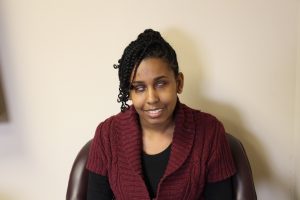
Melissa Lomax, ’14, is a former UMBC English major and Valedictorian candidate who works as the Youth Manager at Blind Industries and Services of Maryland. Read about her experience at UMBC and post-graduation work below:
As a freshman, I declared a major in English and pursued a secondary education certificate. I found motivation to succeed in my thoughts of the many high school students I would be able to teach. However, this dream was very short-lived.
Born blind due to Glaucoma and a host of additional eye conditions, I knew that college would present its fair share of difficulties. By the end of freshman year, I started to wonder if I chose the wrong major. English requires so much reading, and each time I strained my eyes to look at a book, it hurt. I experienced a considerable amount of vision loss by the end of my first year. That summer, I had the opportunity to travel to Damascus, Syria to work alongside a group of nine American and fifteen Syrian youth with disabilities. We went over the United Nations Convention for the Rights of Persons with Disabilities, met with government leaders, and created the storyline for a comic book—The Silver Scorpion. During that trip, I realized just how many opportunities I have in America to gain more skills and become independent. Once I got over the fact that I would not be graduating in exactly four years, I resolved to take one semester off to attend an intense adjustment-to-blindness training program in Denver, Colorado. This program taught me how to read and write braille, use different technology devices and software, travel independently with a cane, and manage my own household. Most of all, this program gave me confidence.
Upon returning to UMBC, I stopped pursuing a secondary education certificate. My thoughts often drifted to questions: what could I possibly do with English major? If I will not teach, what will I do? Within one semester I regained my love for the subject. I found so much joy in reading about diverse groups, genres, and writing styles. Analyzing texts became enjoyable for me. After all, this skill required reading deeper. I added a Sociology minor to compliment my newfound desire to learn about people. Simultaneously, I threw myself into serving my community through tutoring, cleaning, advocating, and more. So often people would ask what they could do to help me instead of asking me to help. I wanted to show others that I could make a difference, and I needed to show myself as well.
I am grateful that I did not drop out of college, though I considered it occasionally. Each semester played out the same. I would get excited for my classes, order accessible textbooks to prepare, and then realize that several of the books did not arrive on time for the first day of classes. On several occasions, I went an entire semester without an accessible textbook. I developed a Plan A, B, C, Z to combat these issues. These hard times propelled me to seek out new solutions to continue fighting for my education. In the end, I was a Valedictorian candidate for the class of 2014 and the first one to have this honor as a December graduate.
One month after graduating, I was offered a job at Blind Industries and Services of Maryland. I am currently a Youth Manager and each day, I have the privilege of designing and managing programs for blind middle and high school students. I make sure that they learn skills to become independent, feel confident, and remain assured that blindness, though annoying at times, should never have the power to stand in the way of their dreams. My classroom does not look the way I imagined it to. At times, it looks like walking on the truncated domes of a subway station to assure a student that he will not fall, swinging across a zip line despite my fear of heights, teaching a student to flip a burger on the grill, or giving students numerous options to access textbooks in college. I completely embrace this change in plans. When students share that they overcame a fear, performed a task independently, or advocated for themselves, I celebrate with them.
This spotlight was originally published on March 27, 2017.